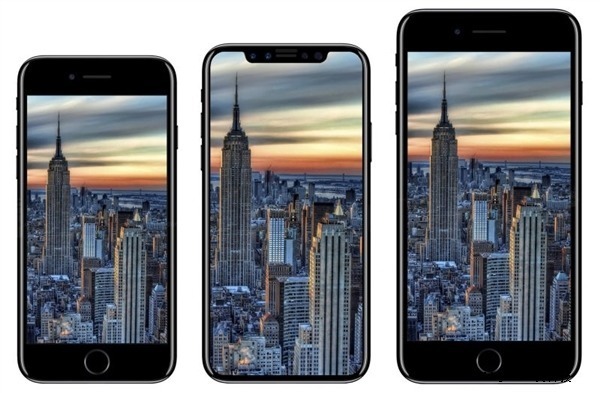With a single-core score more than double that of the Galaxy S8, the "iPhone 10,5" thought to be the iPhone X, leaves the Android device in the dust — and is very close to the 13-inch entry-level i5 MacBook Pro.
The alleged benchmarks for the iPhone X popped up on Tuesday, and was first spotted by Twitter user. The details of the device as far as what we know about core count is accurate.
#iPhoneX spotted on GFXBench.https://t.co/lSPKKfAX5i#AppleEvent pic.twitter.com/CHTy9TLf87
— Kid Pool (@KidPoolDead) September 12, 2017
Other details about the processor include 32KB of L1 instruction cache, 32KB of L1 data cache, and 8MB of L2 cache. The motherboard is identified as a D211AP.
However, the "24 MHz" speed listed for the processor is clearly off — and is either an indication of a fake, or a processor not properly identified by the benchmarking tool. Similar results with misidentified speeds have popped up before on the Geekbench Browser, most notably with new Intel processors.
There is only the lone benchmark for the device at present. AppleInsider has reached out to Geekbench for details on the provenance of the measurement.
For comparison, the A10 Fusion iPhone 7 Plus generates a score of 3514 in single-core mode, and 5970 in multi-core calculations. The new 12.9-inch iPad with A10X Fusion processor scores 3924 in single-core, and 9371 in multi-core.
The Samsung Galaxy S8 scores 2024 in single-core, and 6279 in multi-core, with eight cores.
Benchmarking an ARM processor in a phone and comparing the numbers to an x86 processor, like in the MacBook Pro, is perilous because of architectural differences and the optimizations between processor families. The more linear comparison is mobile to mobile — and ideally on the same operating system.
Join AppleInsider as we cover Apple's special media event live from Apple Park today at 10 a.m. Pacific. Make sure to follow us on Facebook, Twitter, YouTube, and Instagram for all the latest news, analysis, photos, video and more.
 Mike Wuerthele
Mike Wuerthele








 Charles Martin
Charles Martin
 Christine McKee
Christine McKee
 Wesley Hilliard
Wesley Hilliard
 Malcolm Owen
Malcolm Owen
 Andrew Orr
Andrew Orr
 William Gallagher
William Gallagher
 Sponsored Content
Sponsored Content







35 Comments
Repost (posted about this 20 minutes ago):
Looks good, although, only a ~15% increase in single core performance is a bit disappointing.
From my understanding Geekbench isn't the best to compare x86 and ARM, so don't go throwing out your Macbooks just yet. There's a reason websites like Anandtech don't use Geekbench.
Drooling.... want one.
The issue the android guys have is their hardware maybe fast, however, once you put Android OS on the hardware it cripple it, as time goes on, it slows down. Google has a mess of an operating system, which is not optimized for the hardware it is running on, lack good memory management and the list goes on. Android is doing exactly what Wintel did, Intel had to keep making faster and faster hardware just so the OS did not make it run slower than the pervious generation products. Windows was bloatware and Android is the modern version of bloatware for mobile phones.
There has been an earlier benchmark circulating. So this is the second.
but the numbers seem strange. While the single core rating seems about right, though a bit less than I expected, the multi core number is very odd. The reason why the A10x has such good multiprocessing numbers is because it has three cores. And the multi core efficiency from these three cores is very good indeed. But here, we have an impossible situation unless what we’ve been reading about the A11 is wrong, which is possible.
According to the leak, and what’s being reported by several people, is that Apple is using an odd 2 high performance core and 4 high efficiency core design. It’s assumed that it works about the same as the A10, with the high and performance cores not working at the same time.
if that’s true, there’s is simply no way that the multi core number can be equal to double the single core score. But here, it’s way greater than the single core score. So something is wrong. Either people are wrong, and Apple is using a 6 core 3+3 arrangement - same as the A10X, or, they’ve decided to copy the ARM Big/Little arrangement where all cores work when performance is needed. The latter is considered to be a problem, one that Apple avoided in their design.
it will be interesting to see what’s true in a bit over an hour from now.